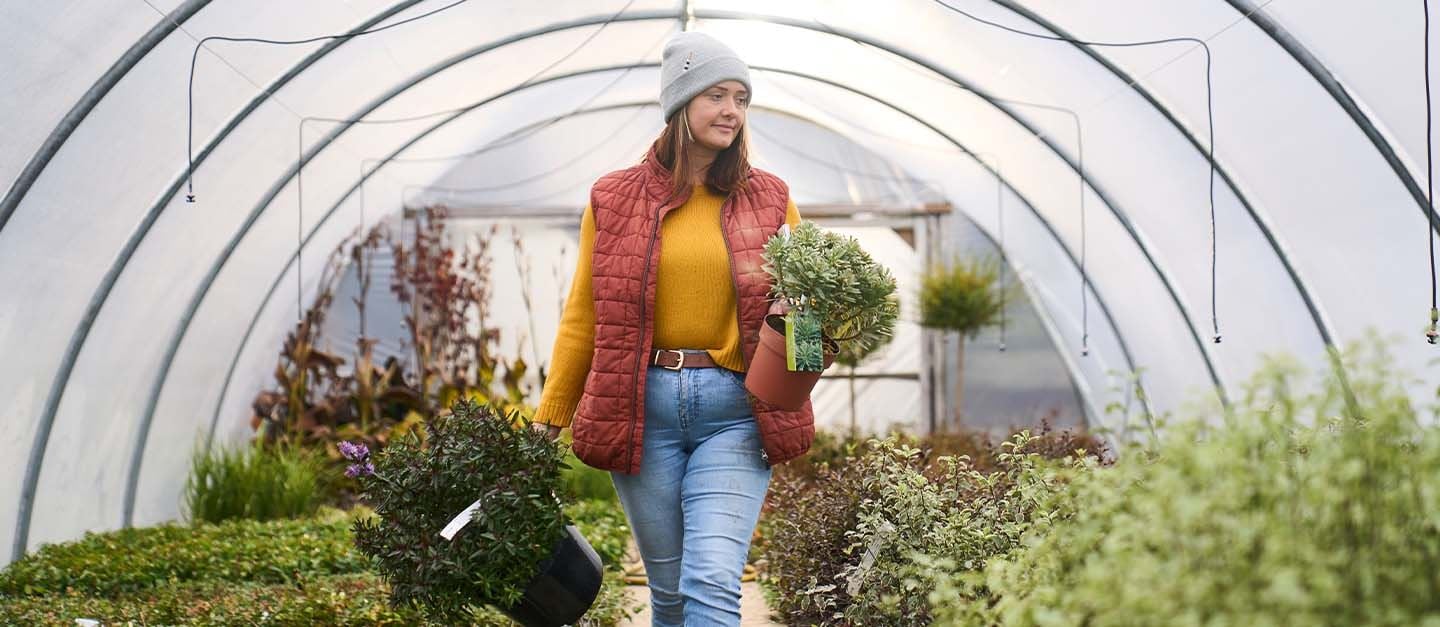Starting your own business often means leaving behind a safe and steady job and stepping out into the unknown of being self-employed.
That’s just what Bryony Mole did when she decided to quit her job as a teacher in order to pursue her passion for gardening. But while being your own boss means you have the freedom to do what you love, it also brings its own set of challenges too.
Here, Bryony talks to AXA about being a woman in a male-dominated industry, the best business advice she’s ever received and why she started her business for love, not money.
Tell us a bit about how you started the business. What was your background before becoming a gardener?
Originally, I was a teacher. I taught for about ten years. I just sort of fell into that really. We had our daughter quite young and being a teacher kind of worked alongside that, but I always wanted to do something that was more for myself. Something that wasn’t really office based, something a bit more me. So, I handed my notice in, but I didn’t know what I was going to do next.
I share an allotment with some of my friends and one of them had started their own gardening business. He was going in for knee surgery and he asked me to help him out with his business for a few weeks while he recovered from his operation, and it was from there that I decided to make a go of this and set myself up as a sole trader and start my own business.
When you first started up, did you have any experience of running a business? Was it a challenge?
Yes. It still is really. I wouldn’t consider myself to be a ‘business person’. I still cringe a little bit when I say I own my own business or call myself a businesswoman. That’s not really how I feel. It’s nice to make money doing this but I kind of goes against who I am. I even find it uncomfortable talking about money with my customers – I do this because I love it, not because of the money. But obviously I have to pay the bills like everyone else.
Setting up the business wasn’t something that had ever come into my head before. So, the obvious stuff like managing my diary, sorting out the equipment that I’d need, that was ok. But things like getting business insurance to protect myself and my customers, or managing the money side of things, doing my taxes, that was all a challenge.
Did you go anywhere for advice? Who helped you out when you were first starting up?
A few people. My friend who already had a gardening business was a big help. He’d been doing it for longer so he knew more of the basics than me. There are a few people around my local area who do similar types of garden maintenance, so we help each other out on some jobs and fill in the gaps in skills where the other person maybe can’t do what you can do. So we help each other out. And my husband is also good on the business side of things, so he helps me with the stuff that doesn’t come naturally to me at all.
And the internet is excellent for pretty much everything else.
Do you think it’s even more important for a sole trader to have a good network around or a good support system?
Yes, I think so. It definitely helps me personally. I’ve probably got about a third of my work after being referred by another gardener or landscaper. Maybe a hard landscaper has gone in and put a new patio down and a new lawn, and it looks amazing, but it needs someone like me to come in to turn it into a nice garden, so they refer the work to me. And it works both ways. If I go into gardens and they ask me to do things that are out of my remit I can refer them back to a hard landscaper. So it works symbiotically which is really nice, and that helps when you’re just one person and you’re limited in your resources.
How do you build that network and get those referrals in?
For me, just because where I am is quite rural it means that a lot of the people here know me. It’s a small village so you get talking to people and everyone’s your neighbour, so that’s really where it comes from. Word of mouth from customers and people who stop and chat while in working in people’s front gardens. It’s quite community based that way, which I like.
What’s one thing you wish you knew back then before you started up?
I think if I could go back I’d try to be more proactive. With things like tax returns, for example, do those things straight away. There’s lots of parts to running a business that you don’t think about. I do this job because I love the work, not because I wanted to do my tax returns or calculate my expenses. So to do those jobs that come with running a business, it’s better to do them first rather than let them hang over you.
And put yourself out there more as well. I’ve been happy to let this business grow quite organically, I’ve let things come to me rather than pushing for things to happen, probably because I wasn’t really confident enough when I first started. But with hindsight, I probably should have had the confidence in myself to push a bit harder to build the business and make things happen rather than letting everything come to me.
What’s your favourite things about being a gardener and owning your own business?
There’s loads of things. I love the actual gardening part. I’m connected with nature, I get to see things grow and I get the instant gratification of seeing a final garden looking nice and the flowers and vegetables growing. Lawns that were ravaged by kids and dogs during a pandemic now starting to look nice and neat again. And the people I work for make it really great. Some of them are older people and I help them with their gardens, and especially over the last few years with the pandemic I would probably be one of the only people they’d see that day. So that social connection of my job is really rewarding too.
And obviously when the weather’s nice and I work outdoors it’s really great too.
Compared to your old job being a teacher, what’s the biggest difference?
I think it’s the flexibility, definitely. Even though it’s me on my own, it’s a lot less pressure. I don’t really have a boss. If I can’t get to something that day or have to cancel, I can rearrange. There’s not a long list of people that I’m disrupting down the line. If I need to juggle things around because the weather isn’t right for the job that day, for example, I can rearrange it in a way that hopefully works for me and my customers, but I have that flexibility.
And also this is something that’s mine. When I work on this and it goes well, that’s because of me. That’s benefitting me and my family and I’m proud of that.
Is gardening still a male-dominated industry?
It’s definitely still pretty male but it’s changing a bit now. But people quite like the fact that I’m a woman doing this job. I get work because people want a female gardener, especially older people or women who live on their own. But I do still come up against some pre-conceived ideas from people about what I can and can’t do because I’m a woman. You have to just prove it by doing it. If I say I can dig a tree out of the ground and take it away in my pickup truck, I’ll show you that’s exactly what I can do.
What advice would you give to other businesses about generating good customer relationships and getting positive reviews?
I think continuity wherever possible is good. If I say I’m going to be there one Wednesday at half nine then I’ll be there at Wednesday at half nine. Just so people know where they stand. And not only knowing what you’re talking about but listening to your customer as well and understanding what they want from their garden. Sometimes what people say they want is very different from what they mean or what can be achieved realistically with the space or resources they have. So you need to understand that too and that helps build a good relationship. If I’m honest and say why something might not work, but I can suggest alternatives, then usually you find some common ground and it’s a better outcome for everyone.
Gardening seems like a job that it’s very seasonal, busy in Spring or Summer but quiet in winter. How do you keep busy in those quieter months?
In winter I do some horticultural copywriting. I got into that through social media. There’s an online plant nursery and I saw on Instagram that they were looking for a copywriter, so I just messaged them. My degree from university was in communications and PR, so that combined with my teaching career and having a horticultural knowledge means I’m pretty suited to it. I do advice blogs on stuff like how to look after your roses in the winter or how to lay out your garden in the right way.
But beyond that, the spring, summer and even the autumn are really full on. I work more than full time, I can do six days a week when it’s busy like that. But in the winter there’s still loads to do if you can diversify. You can learn, you can get your tickets during that time, you can pick up another skill and it’ll unlock new jobs for you. There’s always enough to do if you’ve got the right skills.
What’s the best business advice you’ve ever received?
Have confidence in yourself. When I first started, I was worried about a lot of stuff. What if I go and plant something and then it dies? What if I make a mistake or realise I can’t do it. But you don’t know until you try. If the plant dies there’s probably a thousand reasons for it, it might not be because of you. So have the confidence to just do it and if it doesn’t work out then you can admit you were wrong and you can learn from it. If you don’t know something, you just don’t know if yet. Use it as an experience to learn from.
What tips would you give to someone who wants to start a gardening business?
I know that my imposter syndrome can get quite loud. If I heard someone else thinking of themselves the way I think about myself sometimes I’d just tell them to shut up and be nicer to themselves, but it’s different when it’s your own voice telling you to doubt yourself. So I’m doing a qualification with the Royal Horticultural Society to help convince myself and give myself more confidence in my ability and that I do know what I’m talking about.
So, I’d say go for it, but be prepared to learn stuff. Because you’ll never know everything. You get out of this job what you put in.
And be prepared to be knackered. It’s hard work, but it’s worth it.






